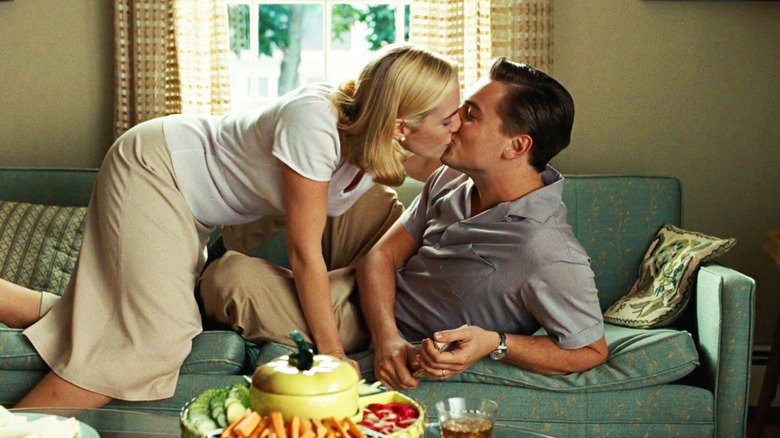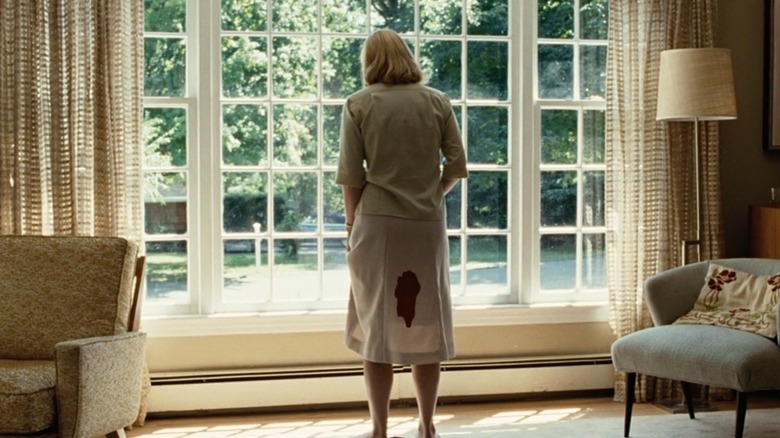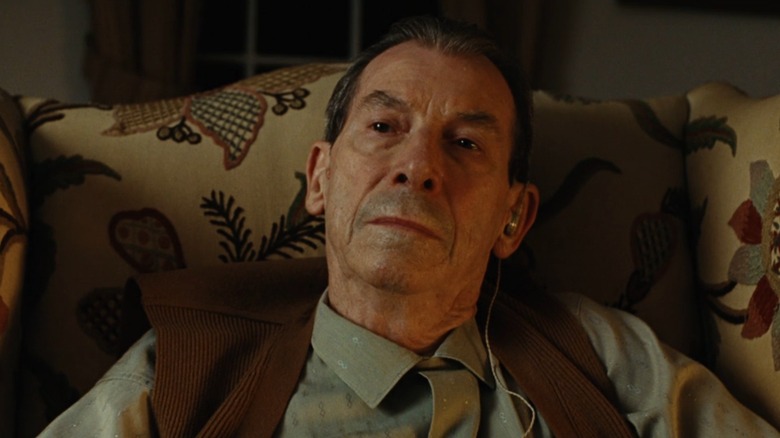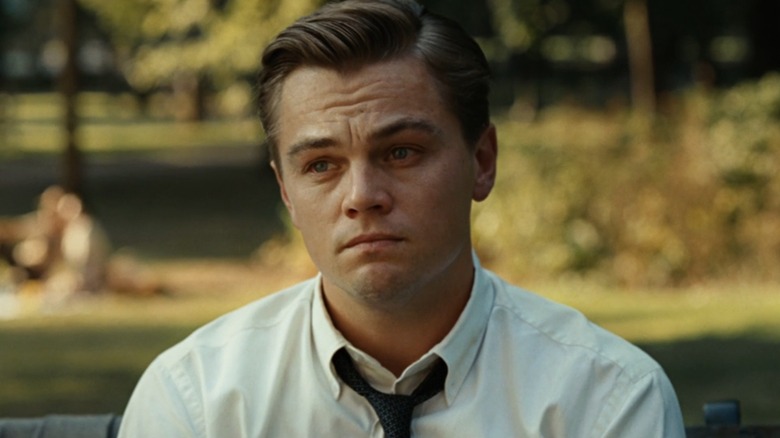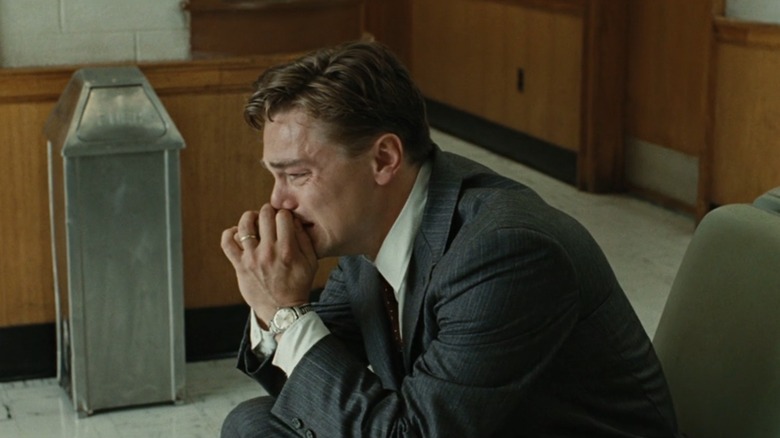The Ending Of Revolutionary Road Explained
After smashing box offices and reducing everyone to tears in James Cameron's "Titanic" with their young, tragic love, Leonardo DiCaprio and Kate Winslet reunited a decade later to ruin everyone once again with another young, tragic love story. Though "Revolutionary Road" is tragic in a far different sense, with less romance and more crumbling relationships.
It's an adaptation of the critically acclaimed, classic 1961 novel of the same name by Richard Yates, brought to despairing life by its talented stars. "Revolutionary Road" starts with the same spark of romance that carried "Titanic" when Frank (DiCaprio) and April (Winslet) meet at a party, but that quickly dissolves as we jump forward several years to 1955 and find them deeply unhappy. April's dream of being an actress hasn't come to fruition, while Frank is working at the same boring job his father did. They've moved to a Connecticut suburb, had two kids, and yet can't get over the feeling that they were meant for something more.
To get out of the rut, the Wheelers decide to move to Paris, but then Frank gets a promotion and April gets pregnant. Frank wants to stay and have the baby, fueling the further destruction of their marriage that culminates in an explosive argument. April then makes a decision that ends the movie in tragedy.
April's abortion goes horribly wrong
This time, Leo survives Kate.
During their final argument, Frank says he wished April had aborted her pregnancy when she had the chance, and then she runs into the woods, distraught. It's there that she makes a crucial decision about how to change things. The next morning, she plays the part of a perfect wife, giving Frank everything he wants, and then calls her neighbor Milly (Kathryn Hahn), who's watching her kids, to choke out a goodbye. Finally, she attempts an at-home abortion, but it goes wrong and she bleeds to death.
Abortion was not legal in any state until 1966, so as a woman desperate to escape her life, April had few options to end her pregnancy. She knew there was a risk, hence the phone call to Milly, but she decided it was worth it. What did she think would happen if she survived? That's left unclear. Maybe she would run away, or maybe she hoped that responding to Frank's words about the abortion would do something, but she knew she could not have a third child.
Much of April's story becomes a harsh commentary on women's options in the 1950s, as she was given no path forward other than to become a housewife and mother. With this lens, the movie gained a reputation in some circles for having a feminist message. Winslet even read "The Feminine Mystique" by Betty Friedan to prepare for the role, according to The Guardian.
A grim cycle of suburban misery
After the devastating revelation that April didn't survive, the movie cuts away from the Wheelers to return to their neighbors. It takes on an almost thriller-like tone in its final moments as we're told that a new young couple, just as promising and interesting and special as the Wheelers, has moved into their old house in the suburbs. Milly and Shep (David Harbour) greet the newcomers, though Shep is clearly still suffering over April's death. He hasn't done anything to get out of his own loveless marriage.
The realtor, Mrs. Givings (Kathy Bates), talks of the new couple in the same way she spoke of the Wheelers — who she now calls too whimsical and neurotic — suggesting they're destined for the same misery. In the final, eerily silent shot, her husband, Mr. Givings (Richard Easton) tunes out her chatting, and we're faced with the realization that he's just as unhappy and stuck in his supposed American Dream as the younger couples.
It's the sameness and conformity of the '50s lifestyle that become a grim threat to their lives. There is no revolution here on Revolutionary Road, only that "hopeless emptiness" that no one will acknowledge.
Frank's resolution differs from the book
Following April's death, Frank moves to New York City, where he becomes a doting, if haunted, father. Tammy Oler of B**** Media pointed out that his ending is different in the book, in which he spirits his children off to relatives, only visiting occasionally. The cruel joke here is that the Wheeler children find themselves in circumstances similar to their parents' upbringings: April's absent parents and Frank's older parents who never wanted kids. In the book, this is what begets a sinister cycle of despair.
However, director Sam Mendes purposefully left out April's difficult childhood, which was used as an explanation for her behavior in the novel. He told Believer Magazine that he omitted it because he felt her past would have made her easily forgiven by the audience, whereas he believes you "should take responsibility for your flaws and take responsibility for your actions and decisions." Still, he said: "But don't you think that April's a truly heroic character? They all want something they don't have and she's the only one who admits it."
As for Frank, Oler observed that he's portrayed in a much warmer light in the movie than in the source material. This, she argued, undermines the popular feminist reading of the film, as it waters down author Richard Yates' "ruthless critique of 1950s masculinity."
Revolutionary Road's tragic ending delayed its film adaptation
In an alternate timeline, the "Revolutionary Road" movie was made without the reunion of Kate and Leo, but rather shortly after the book was released in 1961. However, according to Believer Magazine, the original pitch for a film adaptation fell through because, as author Richard Yates wrote, "Cooler heads in [Sam Goldwyn Jr.'s] organization decided that the movie-going public 'is not ready for a story of such unrelieved tragedy, or so relentless a probing of the sources of pain.'" Later, another potential adaptation was going to change the ending to be more ambiguous.
Even when making "Revolutionary Road" in the 2000s, director Sam Mendes was concerned that April's death via attempted abortion would be targeted for changes. So, to avoid that, he stuck to a small budget to ensure he had control over the final product. While some found the movie too sad to finish, the tragedy is key to the story. Mendes told Cinema.com: "The idea that tragedy is somehow depressing is wrong. If it works, it makes you feel more alive to have that experience, and that's what I'm pushing for in Revolutionary Road."
Despite being a period piece, "Revolutionary Road" remains relatable today for April's distress over the state of her life. In an interview with IndieWire, Mendes said, "We've all found ourselves trapped in situations we felt were not of our own making. And we've all found ourselves being dragged away from what we felt we really wanted in life." He added, "Like with any good movie, I hope [people] see themselves in it. And I hope that they're moved by it ... And I hope it makes people look at their lives."
So, that's all folks. Just a romantic drama that flirts with the everyday horrors of both the past and present.
